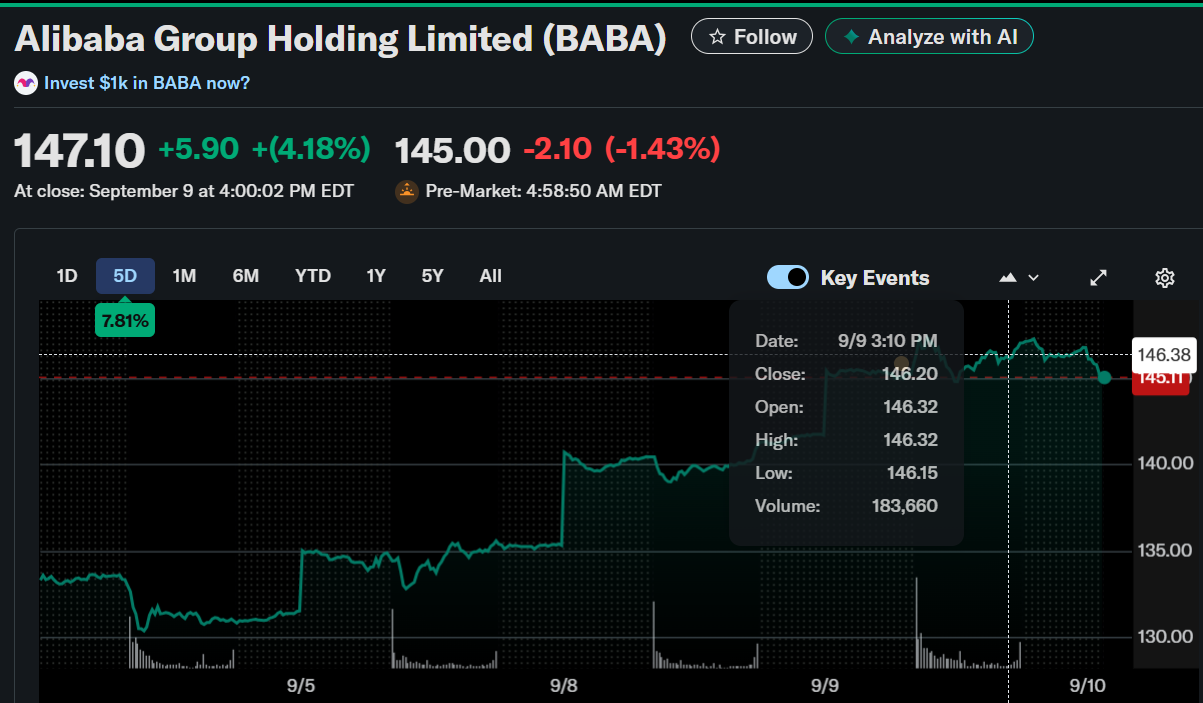Alibaba Group Holding Limited (BABA) shares ended the September 9 session at $147.10, gaining 4.18%, but slipped 1.35% pre-market.

This rise came as Alibaba introduced a major upgrade to its mapping app Amap, signaling a strategic shift. While the stock saw momentum from the AI push, questions remain about competitive and regulatory risks.
Amap has launched a new feature called “Street Stars,” aiming to transform how users explore local services and destinations. The feature uses AI algorithms to rank restaurants, hotels, and tourist spots for 170 million daily users. This shift moves Amap beyond navigation and into Meituan’s core lifestyle business.
To support the launch, Amap has committed 1 billion yuan in subsidies for in-store and ride-hailing coupons. The service will initially reach 300 cities and include 1.6 million business listings across sectors. This approach reflects Alibaba’s broader strategy to build a comprehensive consumption platform around AI capabilities.
Meituan has long dominated the local-lifestyle segment through Dianping, which helps users discover and book dining options. In response, Meituan announced its own revamp and plans to distribute 25 million coupons to retain user engagement. The competition between the two tech giants is now centered on AI-driven user experience and real-time engagement.
Alibaba and Meituan are intensifying their battle in the one-hour delivery space, flooding the market with steep discounts and coupons. The fierce competition comes amid slow domestic consumption, pressuring companies to drive short-term demand through subsidies. As a result, the price war has deepened in key service categories.
The Chinese government has expressed concerns about aggressive pricing models in the e-commerce and delivery sectors. Regulators have held multiple meetings with major firms to warn against unsustainable pricing practices. A prolonged discount cycle could attract further oversight and disrupt growth plans across the tech industry.
Alibaba’s move into lifestyle rankings increases its exposure to these tensions as it seeks to pull users from rivals. The market now watches how far the company can push AI-led innovation without triggering regulatory intervention. As the platform expands, compliance will remain a key balancing act for sustained momentum.
While the e-commerce segment remains stable, Alibaba’s Cloud Intelligence Group is becoming a central growth pillar. The unit reported 26% annual revenue growth, with AI-related services growing at triple-digit rates for eight straight quarters. This reflects growing enterprise demand for AI infrastructure across industries in China.
AI now contributes over 20% of Alibaba’s external cloud revenue, demonstrating the scale of adoption. As companies digitize operations, Alibaba is capturing the shift by offering computing, storage, and AI platforms. This positions the company to benefit from China’s broader AI-led transformation and enterprise modernization.
Alibaba continues to scale its cloud and AI offerings while embedding them across consumer-facing platforms like Amap. The integration strategy strengthens the ecosystem and differentiates it in a crowded market. With both AI and lifestyle services expanding, Alibaba is building a diversified foundation for sustained growth.
The post Alibaba (BABA) Stock: Surge as Amap Takes on Meituan in Lifestyle AI Race appeared first on CoinCentral.
Also read: Voici les 4 films et séries à ne pas manquer sur Disney+ pour la rentrée